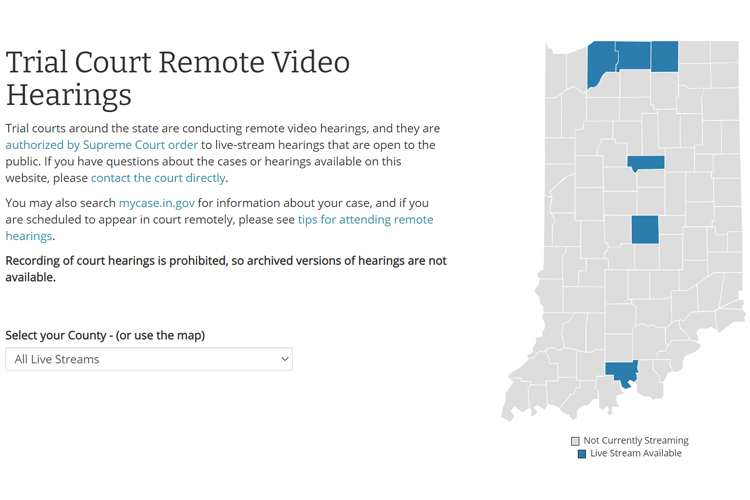By Mary DePrez, Executive Director | Office of Court Technology
Article 1 of the Indiana Constitution proclaims that “all courts shall be open,” that “in all criminal prosecutions, the accused shall have the right to a public trial” and that victims of crime have the right to be “present during public hearings.”
How does a court accommodate the rights bestowed by our Constitution during a public health emergency?
On March 6, 2020, Governor Holcomb declared a public health emergency in Indiana by Executive Order. Because of this, many courthouses were closed to the public temporarily. Courts turned to telephonic hearings and video conferencing software.
The Indiana Office of Judicial Administration immediately recognized the need to provide courts the tools they needed to conduct remote hearings. In mid-April, the Office of Court Technology announced that it would provide each judicial officer a Zoom enterprise license. The enterprise license has increased security and technological features that make a virtual hearing easier to navigate. Instructions and guidance were developed to assist judges and their staff on how to use Zoom and webcast a live stream.

Although these tools allowed parties to participate in hearings, the public did not always have access to them. Due to the ongoing public health emergency and attempting to try to balance the public’s interest in the transparency of judicial proceedings, the Indiana Supreme Court issued an order on April 22 found in part here:
Rule 2.17 of the Indiana Code of Judicial Conduct generally prohibits “broadcasting” of court proceedings without this Court’s authorization. That Rule reflects this Court’s balance, under ordinary circumstances, between the public’s transparency interest and the judiciary’s obligation to maintain order and dignity of proceedings and protect litigants’ due process and fair trial rights. See generally Indiana Commission on Judicial Qualifications Advisory Opinion 1-17. The same balancing is also required during the current public health emergency.
Being duly advised, the Court ORDERS as follows, effective until further order of the Court:
1. All Indiana trial courts are authorized to live-stream court proceedings (except hearings that are confidential by law) on a public platform, including but not limited to YouTube, to accommodate the public’s access to court proceedings. Such a live stream shall be viewable only during the proceeding and shall not be made available for later playback; and no confidential proceedings shall be broadcast on any public platform.
For the first time in the history of Indiana, all courts were permitted to stream public court hearings over the Internet. The Court reiterated in this order that courts should stress to parties and the public that recording the proceedings is strictly prohibited. Zoom allows judges to stream hearings to YouTube but many judges were not comfortable using that platform.
In the beginning of May, IOCT began developing a streaming service for courts to use. The service was put into production quickly, and on June 6, the Trial Court Remote Video Hearings website was advertised to all judicial officers in Indiana. The website serves an alternative to streaming to YouTube, with the added convenience of hosting remote hearings in one location that is easily searchable by the public. The website streams but does not store hearings. Most remote hearing platforms (i.e. Zoom, Webex, etc.) can stream to this website.
The Indiana Office of Judicial Administration has assigned Zoom licenses to over 500 judicial officers. Nearly 200 are currently making their hearings available to the public via the court’s streaming website. The website lists the courts that are streaming virtual and in-person hearings, or a combination of both, in real time. A map of Indiana highlights the counties where streaming is occurring. Over 5,000 hearings have been streamed, with a total of over 30,000 unique viewers since the site went live (statistics as of December 21, 2020). One jury trial in Whitely County had over 1,000 individuals watching the trial at the same time.
At the time of publication, the Court’s order to allow streaming public hearings runs through July 1, 2021.
 For additional information on this topic or court technology in general, please contact Mary DePrez at 317-234-2604 or
For additional information on this topic or court technology in general, please contact Mary DePrez at 317-234-2604 or